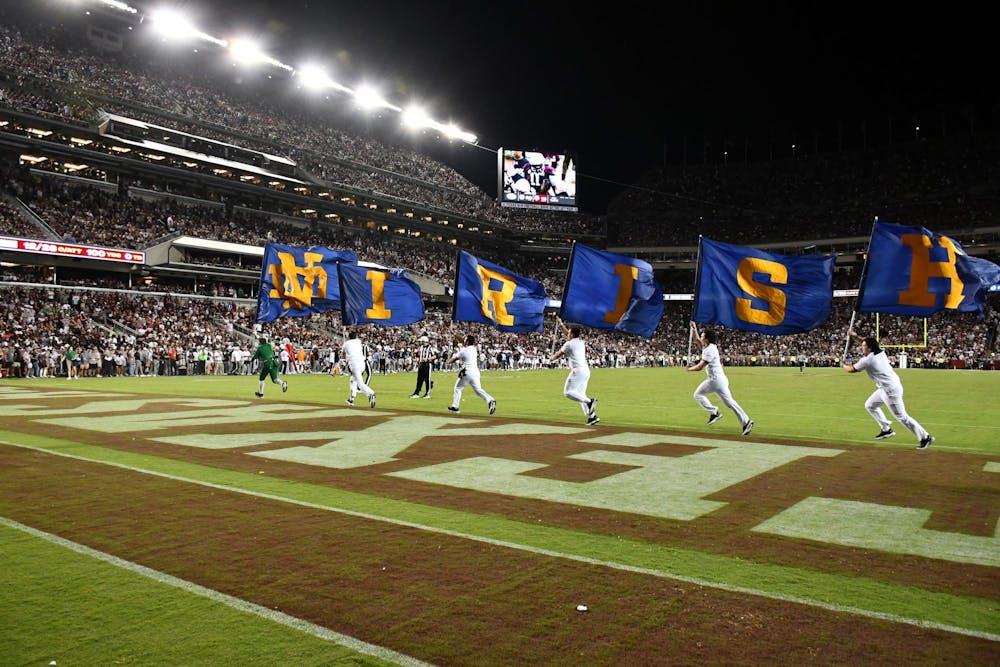It’s been a rollercoaster start to the 2024 Notre Dame football season, with an impressive opener at Texas A&M and a blowout of Purdue sandwiching a frankly embarrassing loss to Northern Illinois. Marcus Freeman’s trio of losses against Marshall, Stanford and NIU in his first three years are reminiscent of losses that defined Charlie Weis’ tenure at Notre Dame: to Syracuse in 2008, Navy in 2007 and 2009 and UConn in 2009.
Freeman’s recent setbacks raise a pressing question: are these signs of an underperforming coaching staff, or expected stumbles for a third-year head coach? Fortunately for Freeman, his teams have demonstrated a level of resilience that Weis’ squads simply lacked. And even more fortunately for Notre Dame, the University has since avoided the costly error of Weis’ 10-year contract, signed just seven games into his first season, which burdened the University with nearly $19 million in payouts over the six years following his dismissal.
Speaking with Notre Dame fans, you’ll hear no shortage of opinions — calls to fire this coach or bench that player. While venting frustrations is part of the fan experience, it’s important to recognize the key distinction in how Notre Dame views student-athletes versus coaches, which rightly directs criticism of the program toward the coaching staff alone.
As former University president Fr. Jenkins emphasized in the New York Times in 2021, football players are not employees but student-athletes, and they are not compensated by the University for services rendered. Like other students, student-athletes can benefit from their talents, skills and image without being classified as University employees. Notre Dame’s decision to uncouple scholarships from an athlete’s injury or performance underscores its commitment to prioritizing the student-athlete experience. At the heart of these values is the recognition that, like all students, athletes are part of the University community, not just for their contributions on the field, but for their participation in the broader campus life.
Coaches, on the other hand, are highly compensated professionals, paid explicitly for their expertise and performance, and are not entitled to the same patience or support extended to student-athletes. According to the University’s 2023 Form 990, Marcus Freeman was Notre Dame’s highest-paid employee, earning $6.6 million — double the salary of any other university employee.
At a minimum, inconsistent performance should serve as a warning for the University to avoid committing to lengthy contracts that could backfire and cost millions, as it did with Weis. Some argue that Notre Dame should refrain from offering high annual coaching salaries in football altogether. We disagree. Fr. Jenkins has correctly pointed out that football generates more revenue for the University than it consumes, helping to support many other varsity sports which couldn’t otherwise function. Coaches with high potential but inconsistent results should be rewarded in kind: high annual salaries with short contract duration. Charlie Weis’s short-lived success at Notre Dame reminds us that the allure of showmanship should never obscure reality; no playoff berth or first-round victory is worth the gamble of a decade-long contract, especially following a loss to NIU.
To Notre Dame’s credit, it seemingly hasn’t offered its first-time head coach a long-term contract. Reporting by Irish Illustrated and Football Scoop suggests Freeman’s first contract lasts five or six years. At the same time, Notre Dame purportedly signed both coordinators to longer-term four year contracts in its pursuit of experienced coordinators, breaking the previous three-year contract record that had only been offered to Tommy Rees and Al Golden.
Offensive coordinator Mike Denbrock's record-breaking four-year deal also made him the highest-paid offensive coordinator in the country. The return? Notre Dame ranks 112th in passing efficiency, and after three games, our starting quarterback still hasn’t thrown a touchdown pass. The lesson? Lengthy, lucrative contracts increase the risk of saddling the program with high-priced, underperforming coaches, leaving limited options for an easy exit.
Notre Dame has ample opportunity later this season to demonstrate it won’t play down to the level of competition, with matchups against Miami (Ohio), Navy and Army. Freeman, Denbrock and Golden can still right the ship.
But even if Notre Dame fights its way back into playoff contention, the University’s leadership should remain mindful of the pitfalls experienced during the Weis era, a chapter that reminded us all that consistent on-field performance must come first before offering long-term job security.
Good coaches deserve fair compensation, but lengthy contracts can cripple a program and expose the University to unnecessary risk. With coaching salaries at the top of college football skyrocketing over the past decade, their performance should face greater scrutiny — not less — and contracts should be shorter in length. Perhaps, like the students they lead, coaches thrive best with the urgency that comes from knowing their time here is limited.
When Freeman leads the team to playoff success and proves the program belongs with a win or two, the University should reward him. Just be sure not to sign away another decade in the process.










